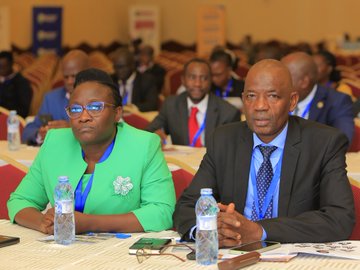The three-day CPA Economic Forum running from 3 – 5 July 2024 organised by the Institute of Certified Public Accountants of Uganda (ICPAU) has kicked off at the Imperial Resort Beach Hotel, Entebbe, and online.
The Forum is an economic policy think tank that generates thought leadership discussions to develop economic policy recommendations and forwards the same to the Ministry of Finance, Planning and Economic Development as input into the national budgeting process.
Speaking on the opening day, CPA Derick Nkajja, the Chief Executive Officer of ICPAU, encouraged members to join the different regional member networks to strengthen the Certified Public Accountants (CPA) Brand at grassroots levels.

ICPAU President, CPA Josephine Ossiya, in her speech, said the 11th CPA Economic Forum Proposals for tourism including the redevelopment of sites like the Source of the Nile, recreation spas, upgrading airstrips, and development of cable cars on Mt Rwenzori were adopted for implementation in the 2024/25 FY.
On education, she said support for the new curriculum is a priority for the 2024-2025 financial year. On tourism, she said Uganda’s economic growth saw significant contributions from the tourism sector.
“The government prioritizes marketing and promotion. We recommended the enhancement of tourism infrastructure. The government announced plans for the modernisation of tourism products in the budget speech,” she noted.

According to CPA Ossiya, the Minister for Finance announced plans for modernisation, including upgrading the Uganda Museum and facilitating hiking on the Rwenzori Mountains.
“The will of the government towards transformation is evident, but we need to get involved in resource mobilisation and policy input. Let’s debate actively throughout the forum period to contribute to the development policies that form the foundation for progress,” she stated.
In his keynote address, Joseph Enyimu, the Commissioner of Economic Development Policy and Research at the Ministry of Finance, Planning and Economic Development, shared insights on how ICPAU’s Economic Forum continues to be a great platform for government policy recommendations.

He encouraged accountants to be part and parcel of the Government of Uganda’s 10-Point Growth Programme.
“We need accountants to audit, edit, and create room for growth within the programme,” said Enyimu.
“Providing accounting, audit, and advisory services, especially to those in productive sectors, will support their growth,” he added.

Public debt management
The forum also featured a session on “Public Debt Management & its Impact on the Economy” by Hon. Ibrahim Ssemujju Nganda, Member of Parliament, Kira Municipality and Corti Eliab Paul Lakuma, Senior Research Fellow, Economic Policy Research Centre.
According to Hon. Nganda, Uganda currently pays up to Shs12bn annually in debt repayments, commitment fees, and interests to the Chinese Government and Agencies.
He believes the Budget Theme for FY 2024/25 should be ‘Budgeting for Debt Financing,’ given Uganda spends over 47% of the National Budget on debt repayments.

He emphasized the need for the government to have planned borrowing, ensuring full utilization of borrowed funds to grow the economy.
“Unplanned borrowing leads to heavy costs on commitment and repayment plans,” stated Nganda.
Lakuma, on his part, stated that debt remains an essential part of the government’s financing mix, noting that Uganda’s debt has increased considerably in the last decade.

“However, issues of debt acquisition, utilisation, management, and sustainability have come to the fore recently. This calls for a review to achieve better policy outcomes, as debt repayment crowds out expenditure on other critical sectors,” said Lakuma.
On Uganda’s Credit Ranking, Lakuma cited Moody’s last assessment on 22 May 2024, which downgraded the Government of Uganda’s long-term foreign and local currency issuer ratings to B3 from B2, citing diminished debt affordability and financing options.
“Public debt remains sustainable, staying below the 50% threshold. The majority of external sources pose exchange rate vulnerabilities, but robust reserves and rising exports provide stability,” he noted.

According to him, concessional loans dominate, with a recent uptick in commercial lending while external debt faces increased interest rate risks; domestic debt benefits from fixed rates.
“The long-term structure of domestic debt offers security. Significant domestic debt maturing in a year calls for strategic management,” he concluded.












